'I couldn't be an imposter': How Austin Butler vanished into the role of Elvis Presley
Usually, it was around 3 in the morning.
Austin Butler would wake up in a cold sweat and sick to his stomach. For months. Each time the feeling struck, he knew the only cure was to get back to the alchemic task of turning into Elvis Presley.
Butler would cue up an old Elvis interview or performance, and work to internalize the voice, the walk, the man, the myth.
“The feeling was strong, like, am I going to fail, am I going to let everyone down?” Butler, 30, tells USA TODAY. “So I redefined that feeling. I called it ‘free energy.’ I didn’t need coffee. I had that.”
So credit good ol’ endorphins for Butler’s uncanny metamorphosis from heartthrob on shows like Freeform's "Switched At Birth" to the King of Rock 'n' Roll in “Elvis,” Baz Luhrmann’s sweeping biopic (in theaters Friday).
Well, that and help from a small army of experts that included dialect coaches, singing instructors, karate sensei and Polly Bennett, the choreographer who guided Rami Malek to an Oscar for his portrayal of Queen frontman Freddie Mercury in “Bohemian Rhapsody.”
Fact checking the new 'Elvis' movie: Did he really fire Colonel Tom Parker onstage in Las Vegas?
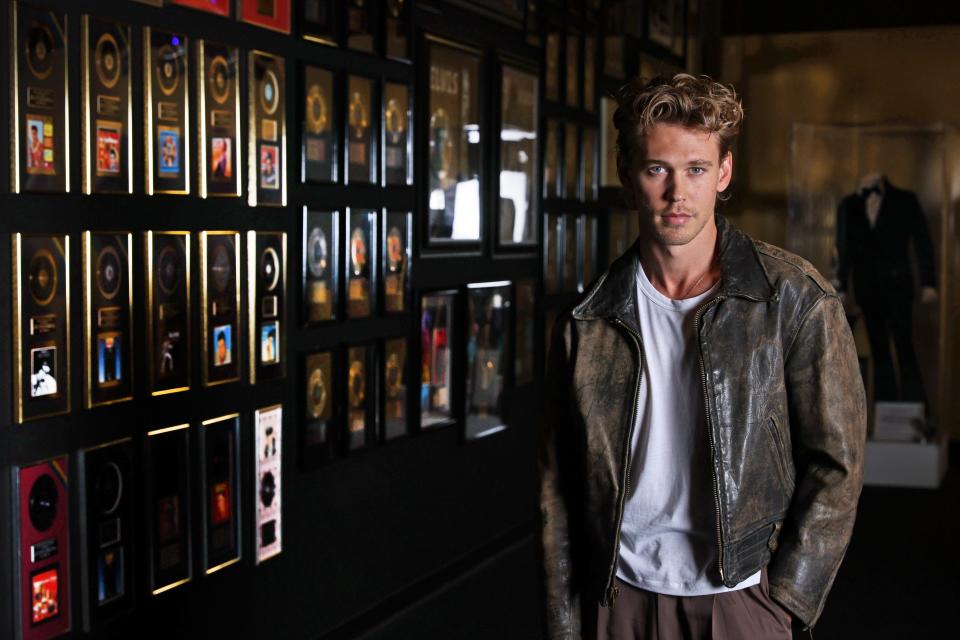
By his own account, Butler says the pandemic played another role in his quest to embody the boy from Tupelo, Mississippi, who shocked a prudish 1950s America with his hip-swiveling, lip-curling, Black music-steeped magic.
Just when Luhrmann was set to start filming in Australia, Tom Hanks, who plays Elvis’ Svengali, Colonel Tom Parker, came down with COVID-19.
“I wasn’t ready," Butler says. "And then suddenly, production shut down and I had six more months to rehearse. I started to feel like it was me living with it every day."
Hanks has nothing but praise for his young co-star.
“I don’t think he had a day off, in years,” says Hanks, a two-time Oscar winner. “If he wasn’t going to the dojo, he was in choreography or a recording session. If the real moment exists on film, we re-created it.”
That meant Butler would be scrutinized by billions of Elvis fans worldwide. That pressure demanded a commensurate artistic effort.
“Look, you can’t play Elvis in a movie called ‘Elvis’ any more than you can play Buddha in a movie called ‘Buddha’ without going to the well and drawing deeply,” Hanks says. “Because there’s going to be massive macro and micro attention on every choice you make.”
Review: Austin Butler rules as the King, but Baz Luhrmann's 'Elvis' is an unchained mess of a movie
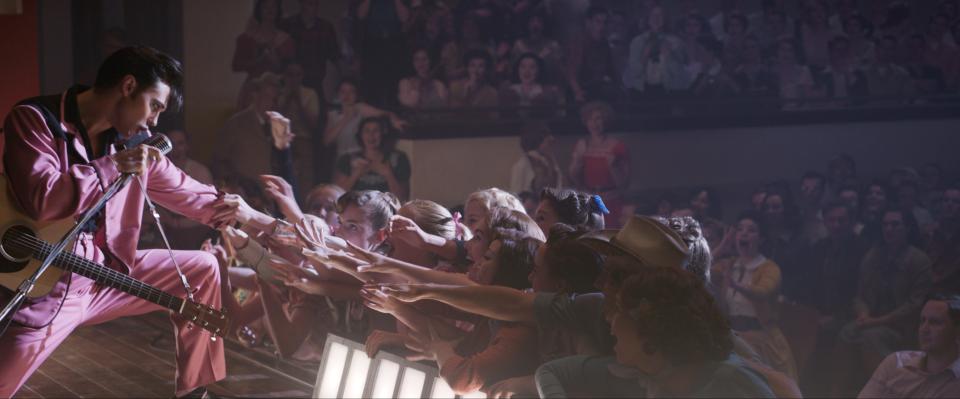
Hanks says he expects a bit less scrutiny given how little most people know about Parker. But the promoter's pivotal role in Elvis' story was an immediate lure, Hanks says.
For his part, Luhrmann knew he needed a legend to pull off a role that was pivotal to his film's success.
"I'm not doing a biopic; rather, it's like when Shakespeare would take a historical figure and explore a larger theme," he says. "The best contemporary version of this I can think of is (1984's Oscar Best Picture winner) 'Amadeus.' Is 'Amadeus' about Mozart? Actually, it's (Antonio) Salieri's story. Who is he? And there's the rub, my friend. There you have a drama."
Hanks says he had never even seen a photo of Parker before Luhrmann lured him for the part. The actor's own transformation in “Elvis” included a fat suit and the adoption of a peculiar accent, part Southern, part Dutch.
The former allowed him to “physically and spiritually” inhabit the Colonel’s shoes, while the latter was something he says he “had to backpedal on” after early versions “caused too many questions.”
Despite his decades of acting experience, Hanks, 65, says the looming challenge made him just as nervous as his younger castmate.
“Once, I saw Austin and pulled him aside and just said, ‘I have one question for you, do you want to throw up behind the stage door before me or after me?’" Hanks says. "Because I was petrified. We both were petrified.”
Austin Butler as 'Elvis': His 'Elvis' acting lessons began when Tom Hanks delivered a typewriter to his door
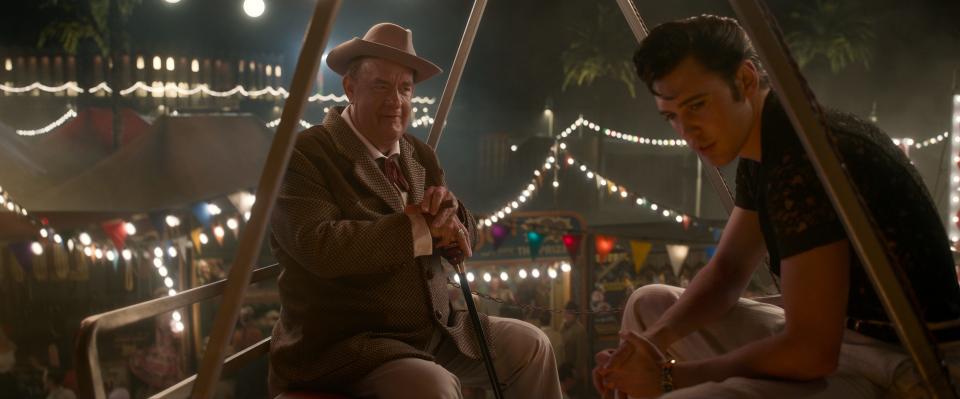
How Austin Butler went from 'Switched at Birth' to Quentin Tarantino to Elvis Presley
Butler says he remembers as a youngster when his grandmother, who “was a teen in the ‘50s,” played Elvis songs. He recalls dancing as a kid to “Blue Suede Shoes.” Otherwise, Elvis was new to him, a seemingly unknowable icon from a previous era.
Butler’s journey to the role of his young lifetime began with guest spots on "Hannah Montana" and "iCarly" in the late aughts, followed by more regular roles in "Switched at Birth" and teen shows on Nickelodeon, MTV, CW and the Disney Channel. In 2019, he made a big-screen splash as Manson Family regular Tex Watson in Quentin Tarantino’s “Once Upon a Time in Hollywood."
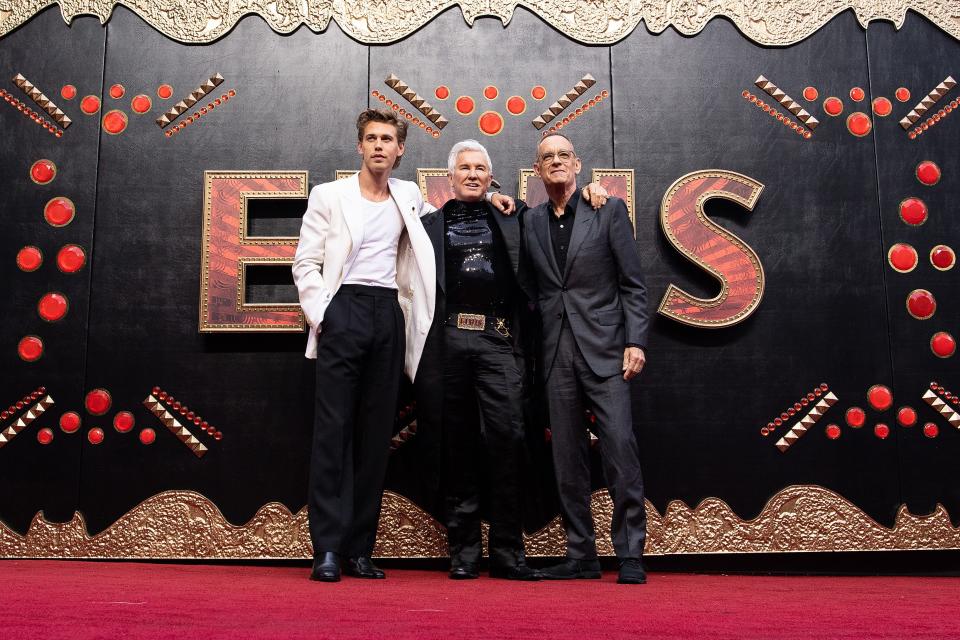
There's the home video he sent Luhrmann of him singing “Unchained Melody,” which he says he sang, in the audition clip, with his mother in mind. Like Elvis, Butler lost the woman he calls his "best friend" when he was 23. Butler says that connection drew him even closer to the project.
Luhrmann describes the surprising video submission from Butler as less an audition tape and more "a private spy cam of someone having an emotional experience."
There was also Denzel Washington's cold call to Luhrmann, whom the director of "The Great Gatsby" and "Moulin Rouge" had never met before. The actor wanted to tout Butler’s work ethic after the pair shared a Broadway stage in Eugene O'Neill's “The Iceman Cometh” in 2018.
“What a revelation he is,” Luhrmann says of Butler. “From the moment he walked into our first meeting all the way to the end, he lived as Elvis. Not in the way a Method actor would. It was more organic than that. His natural voice even lowered throughout the shoot. He somehow just became Elvis.”
Butler summoned the ghost of Elvis, who died at age 42 in 1977, for nearly two years as the production lurched through the pandemic. To sustain that intensity, he dove into all the original source material he could find. Butler read countless interviews and profiles as well as Peter Guralnick's definitive Elvis biographies, “Last Train to Memphis" and "Careless Love," which he considered his “bibles.”
Butler says he watched every Elvis movie, performance video, and media interview extant, many of them found in Graceland's own archives. On his laptop, he’d created files of Elvis moments by date, providing easy access to songs and interviews from specific periods of Elvis’ life.
That catalog proved critical because, as with most movies, scenes were shot out of sequence.
“So I’d be in hair and makeup and think, ‘OK, today it’s 1956, what was Elvis singing then, what were his hopes and dreams and fears?” he says. “I couldn’t be an imposter. I had to really experience him fully as he was then.”
Butler strove to understand “how Elvis moved and reacted to anything, so if I was brushing my teeth, I’d wonder, how would Elvis brush his teeth?”
Helping him with that quest was the blessing of Priscilla Presley, whom the actor met early in the filmmaking process during a visit to her house on the Graceland property. Presley embraced Butler and told him he had big shoes to fill, but that he had everyone's support. And then she added something else.
"She said, 'I believe Elvis' spirit is in Graceland, you need to spend time there,'" he says. "So the next day, I just spent the whole day in the house by myself."
Besides getting into the right head space, Butler also had the benefit of prosthetics. Butler used his own slight frame to portray Elvis as a rocking teen and 20-something, but as he aged, padding was added to the Elvis wardrobe to present a man who, as he closed in on his 40s, was letting himself go.
Putting on those constricting outfits, particularly the flashy jumpsuit used in the final years of Elvis' stage life, had a psychological impact.
"I was strapped into the jumpsuit and my lungs felt constricted. I could only take shallow breaths and it was very hot," Butler observed in the film's production notes. "It felt very claustrophobic, and I felt a great sadness because I’m sure Elvis felt the same way, that he could hardly breathe. And yet his voice still soared.”
For Austin Butler, the key to Elvis was understanding the twinless twin
Of course, then there was the music, from the early hits to the movie soundtracks to the gospel hymns Elvis adored the most. Butler listened to as much of the Elvis song catalog as he could.

“Every day, when I’d drive home from the set, I’d put on ‘Polk Salad Annie,’ ‘Never Been to Spain’ and ‘Milkcow Boogie Blues,’" he recalls. Early on, Butler knew he would have to summon the early Elvis hits himself, largely because those scratchy mono recordings couldn't be used on the movie’s soundtrack.
“All the ‘50s stuff, that’s me,” he says with obvious pride slipping into his low, still-Elvis-y voice. “After that, it’s a mix of me and Elvis.”
That mix includes scenes from the iconic 1968 so-called Comeback Special on NBC, in which Butler, in his black leather suit, does an uncanny impression of Elvis moves along with a digital assist from the real singer’s voice.
It also didn't hurt that Butler started playing guitar at age 12, allowing him to expertly mimic Elvis' own chops.
"Can't Help Falling In Love" with @AustinButler #ElvisMovie pic.twitter.com/moK6RcBNAc
— Elvis Movie (@ElvisMovie) June 15, 2022
"My parents used to ground me taking away my guitar, 'cause I would just sit in my room and play for eight hours a day until my fingers bled," Butler told GQ.
Late in "Elvis," when the singer hits the Las Vegas stage for his hotel residency, Butler again does his best to capture his dynamic stage act and vocals. Modest by nature, Butler can't help but offer one self-compliment.
“On ‘Suspicious Minds’ in particular, I can’t tell when my voice ends and his begins,” he says. The quick smile says it all.
Elvis' daughter, singer Lisa Marie Presley, offered her own compliment on the movie at its Memphis premiere this month.
"The only reason I'm here (is) it's been done right," she told the Memphis Commercial-Appeal.
Ask Butler how he achieved this soul-meld with Elvis, and he gets metaphysical fast.
"Think about it, Elvis is in the womb with Jessie, his twin brother, your other half who you're touching, while your mother, Gladys, is at that time doing a lot of buck dancing, going to church and dancing as the preacher is preaching for eight hours," he says.
"Jessie comes out first, but he's stillborn. Gladys and her husband Vernon are in the midst of the most grief they've ever felt, but suddenly Elvis is born, and he's a miracle for them from that moment on. And you, Elvis, you're a twinless twin, always connected in some way. So it was about finding all the keys I could to his humanity."
For a long time, Butler, the onetime child actor, had trouble telling where he ended and the legendary singer he was portraying began. After nearly two years on the project, channeling Elvis daily, Butler experienced culture shock when the final scene wrapped.
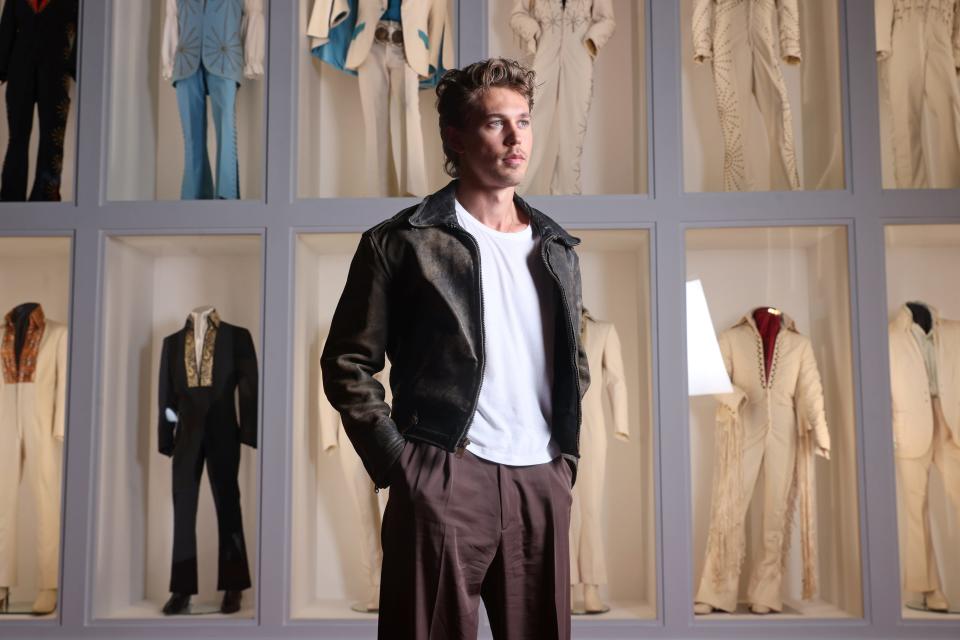
“That last day, I didn’t know who I was, and my body was dead at that point, too,” Butler says. “It’s like an emotional whiplash. I started to wonder, ‘OK, what are my passions, what do I like to do?'"
No doubt, he'll remember soon. And Elvis will become a lasting memory, Butler's own vestigial twin. Gone, but never forgotten.
“I realized this man was as iconic as they come, and yet he of course was a human being, sensitive and vulnerable, with virtues and flaws, and I got to experience all of that,” Butler says. “This was an incredible privilege. I was just a detective, trying to find the truth of who he was. Trying to find Elvis' soul.”
This article originally appeared on USA TODAY: 'Elvis' movie: Austin Butler's Presley transformation includes singing
